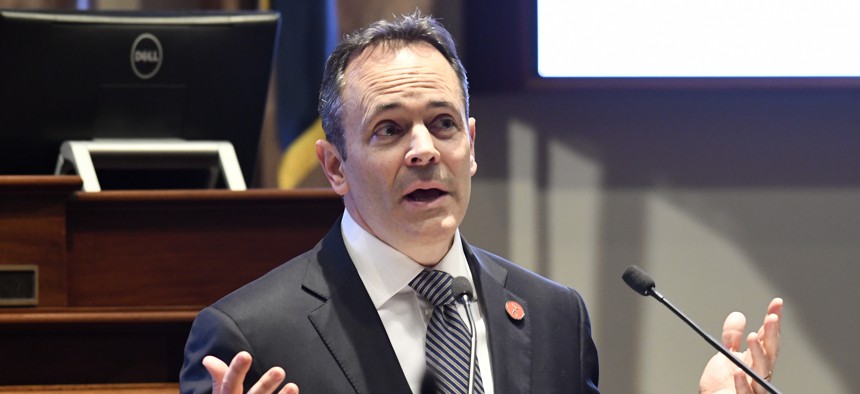15 Kentuckians Sue Trump Administration Over New Medicaid Waiver

Kentucky Gov. Matt Bevin. (AP Photo/Timothy D. Easley)
The plaintiffs contend that waivers that require work as a prerequisite for health coverage will cause “irreparable harm to the health and welfare of the poorest and most vulnerable in our country.”
Fifteen low-income Kentuckians have fired the first salvo against the Bluegrass State’s recently approved Medicaid waiver that made employment and employment-equivalent activities a prerequisite for eligibility in the federal program.
The 15 Medicaid beneficiaries have filed a class-action federal lawsuit against the Trump administration for allowing that waiver—which also establishes premiums for certain enrollees and locks those beneficiaries whose payments or work status lapse out of the program for six months—to go into effect.
The plaintiffs in Stewart v. Hargan, represented by the National Health Law Program, the Kentucky Equal Justice Center and the Southern Poverty Law Center, contend that “through imposition of premiums and cost sharing, ‘lockouts,’ benefits cuts, and a work requirement, the waiver will radically reshape Medicaid in a manner that, but the state’s own admission will result in substantial reductions in coverage.” And that the changes this waiver will make will “harm Kentuckians across the state.”
Kentucky’s own estimates show that as many as 95,000 fewer people will be covered by the state’s Medicaid program under this waiver.
The objections of the plaintiffs in this case are a matter of both policy and process. First, they argue that the effects of the waiver would “sharply deviate from the congressionally-established requirements of the Medicaid program.”
Second, the plaintiffs took issue with the way in which the Trump administration went about setting these policies in motion. They called out the letter sent by Centers for Medicare and Medicaid Services Administrator Seema Verma to state Medicaid directors which gave guidance on how to design future work requirement waivers.
That letter, they argue, breaks with standards set for such communication. “The Dear State Medicaid Director Letter,” the lawsuit states, “was not submitted for notice and comment, and was not published in the Federal Register.”
The 15 plaintiffs, who range in age from 20 to 62, describe their fears for potential health and financial struggles that they claim would befall them if this waiver were to be implemented in full.
Under the waiver, the oldest of the plaintiffs, Ronnie Maurice Stewart, a 62-year-old retiree would find himself subject to work requirements and required to pay a monthly premium of up to 4 percent of his income for Medicaid coverage.
According to the lawsuit “premium payments are a significant concern for Mr. Stewart.” He expects that he will be able to afford to pay the premium to keep his health care, but anticipates that it might mean he can’t pay for other expenses like “food and rent.”
As a full-time student and caregiver to her children, Shanna Ballinger, 27, is exempt from work requirements under the waiver. But she is concerned about the waiver nonetheless. Her husband Matt is the family’s primary breadwinner, and his hours for his job at a Hobby Lobby store in Elizabethtown fluctuate considerably from week to week. The Ballingers would be required to report any fluctuation of income—a reality for Matt’s job—within 10 days or they risk losing their Medicaid coverage and being locked out of the program.
The family has had a number of expensive health issues over the years, and Shanna Ballinger believes that “the family would be homeless if not for Medicaid.”
The case will come before the U.S. District Court for the District of Columbia in the coming months.
Quinn Libson is a Staff Correspondent for Government Executive’s Route Fifty, based in Washington, D.C.
NEXT STORY: DOJ Sideswipes Mayors Gathering With Immigration Subpoena Threat






